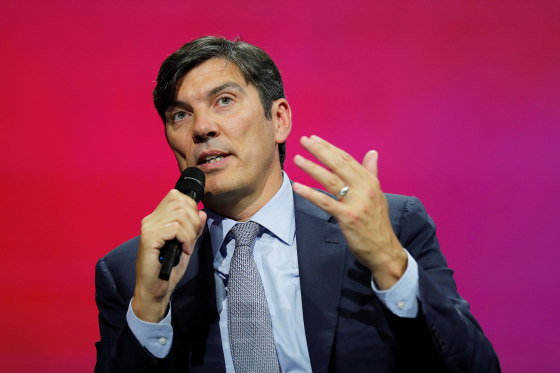Tim Armstrong, who has led Verizon’s effort to create a digital content and advertising competitor to Google and Facebook, is in talks to leave the company.
Armstrong was CEO of AOL when it was bought by Verizon in 2015 for $4.4 billion, and oversaw the company’s content efforts, which included buying Yahoo for $4.8 billion in 2016. Those two companies were merged into Oath, a company within Verizon that was run by Armstrong and looked to combine a large internet audience with advertising technology to attract marketing dollars.
Negotiations over Armstrong’s departure were first reported by The Wall Street Journal and confirmed to NBC News by a source familiar with the situation who was not authorized to speak publicly.
A spokesperson for Verizon declined to confirm or deny the talks. "We don't comment on speculation and have no announcements to make,” the spokesperson wrote in an email.
Armstrong, a former Google executive who has been a fixture in the advertising industry, had reportedly wanted Verizon to spinoff the AOL-Yahoo unit, but Verizon decided they wanted to keep it. A separate source close to the company who requested anonymity in order to speak openly said Armstrong had been frustrated by that decision.
Armstrong’s departure would be another setback for Verizon’s efforts to move beyond its existing telecommunications service and into content production and monetization. In July, Verizon shut down it Go90 digital video platform, in which the company had reportedly invested hundreds of millions of dollars. Verizon had also reportedly approached 21st Century Fox and CBS about acquisitions.
Oath’s websites, which include Yahoo.com, Yahoo Sports and Yahoo Finance, The Huffington Post and AOL.com, combine to be the third-most visited platform on the internet, garnering around 209.8 million unique visitors in July on desk and mobile, according to the online measurement firm ComScore.
While Oath competes with Google and Facebook on web traffic, it trails in ad revenue. Google and Facebook are projected to bring in $39.9 billion and $21 billion in 2018 compared to $3.7 billion for Oath, according to the digital ad research firm eMarketer.
Two advertising agency sources who spoke on the condition of anonymity to avoid compromising their business relationships said Armstrong had struggled to integrate Yahoo and AOL and pair its content with consumer data from Verizon, a combination Armstrong had hoped would make Oath a destination for advertisers.
AT&T has similarly touted its ability to combine content with consumer targeting data from its sizable wireless and internet customer base. But Craig Moffett, an analyst who covers Verizon for the research firm MoffettNathanson, said that kind of strategy now appears difficult to execute.
"This is less a story about personnel and more a story about why Oath hasn't really worked," Moffett said. "Politically, it's incredibly sensitive. The phone companies have an implicit covenant with users and regulatory bodies that requires they hold themselves to a much higher standard than Google and Facebook.”
Verizon has indicated that it tends to stick with Oath.
“Our commitment is as strong today to Oath as it has ever been,” said Matt Ellis, Verizon’s chief financial officer, at a conference Friday in Beverly Hills, California, hosted by Bank of America.
Armstrong would be the fourth senior Verizon executive to leave in recent months. Lowell McAdam stepped down as CEO in August, while Marni Walden, executive vice president of global media, and John Stratton, president of global operations, also left recently.
Armstrong has been floated as a potential CEO candidate for the ad giant WPP.
